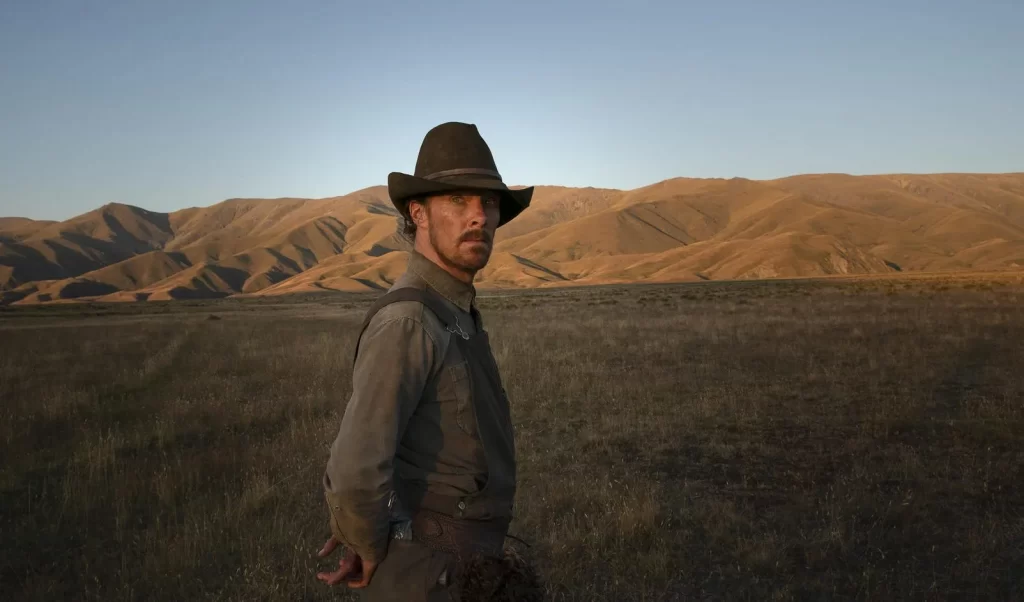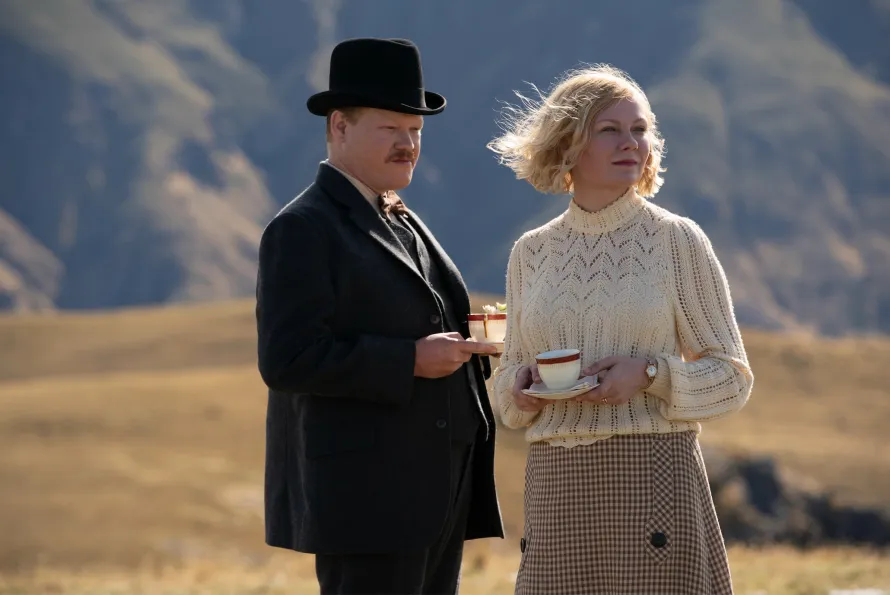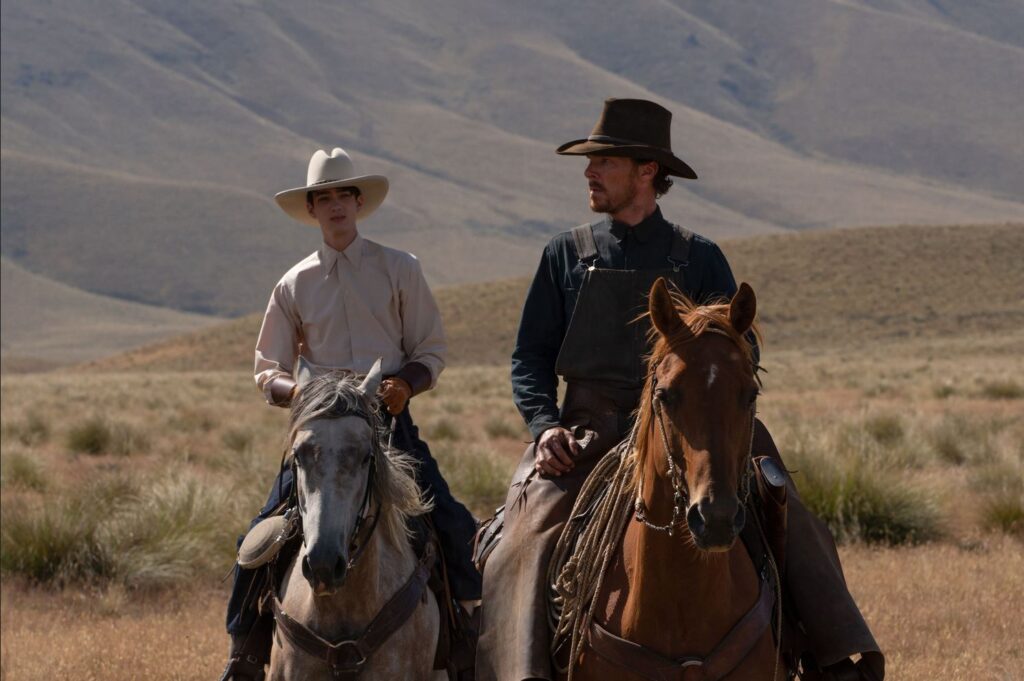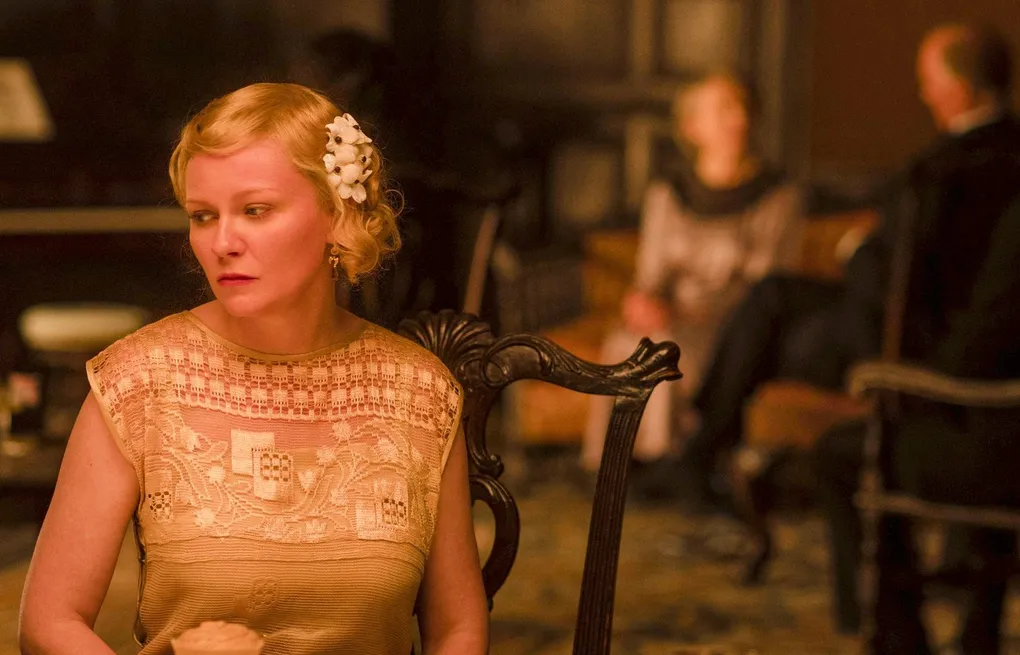
A man in a black hat riding a horse. A woman with a flower in her hair serving a meal. A sprawling ranch, a glinting sunset, a bottle of booze. These are the artifacts of the Western, one of cinema’s oldest and most durable genres. They are also, in the hands of Jane Campion, raw clay to be modeled and molded, reshaped into new forms both beautiful and angular. The Power of the Dog, Campion’s first feature in a dozen years and arguably the best work of her long, too-infrequent career, treats the Western much like the carcass that one of its characters encounters on his dusty travels; it picks its bones clean and then assembles the harvest into a rich, tantalizing story of cruelty, desire, and retribution. It doesn’t so much upend the form’s conventions as weaponize them to reimagine a new kind of movie altogether.
Campion is hardly the first filmmaker to interrogate the complicated history and inherent stereotypes lurking beneath the familiar tales of cowboys and Indians; it’s been nearly three decades since Clint Eastwood deconstructed his own mythos in Unforgiven, and ever since (not to mention before), countless artists have breathed new, investigative life into that same classic carcass. But The Power of the Dog is especially notable for how it wields the twin powers of absence and suggestion. There are no bloody shootouts (nary a gun is even fired), but the threat of incipient violence still looms over its Montana setting like a storm cloud. There is no sex—an offscreen marriage generates no more visible ardor than a few chaste kisses on the cheek—but the screen nevertheless seethes with unconsummated longing. And there is no tin-starred sheriff maintaining law and order, but crime is still very much afoot.

The prime suspect for any potential wrongdoing is plainly Phil Burbank (Benedict Cumberbatch, magnificent), a garrulous, hotheaded cowpoke who runs a vast ranch with his more reserved brother, George (Jesse Plemons). Cumberbatch is British, while Campion hails from New Zealand (where shooting took place), but together they conspire to depict Phil as the embodiment of a distinctly American masculinity: rugged, yes, but also learned and slippery. He is both an aristocrat and a slob, a Phi Beta Kappa graduate of Yale (he majored in classics) who favors salty talk and poor hygiene. Cumberbatch, in a performance of fearsome charisma and smoldering sensuality, doesn’t play the character as a contradiction but as a man entirely at ease with his own supremacy, regardless of venue. A gifted conversationalist with the social gravity of a black hole, Phil is always both the most attractive and the most repellent man in the room, magnetizing others with his allure and endangering them with his menace. Throw a dinner party in this one-horse town, and the only thing worse than having Phil skip it is having him show up.
The Power of the Dog, whose screenplay Campion adapted from a novel by Thomas Savage, understandably arranges its remaining characters relative to Phil’s captivating orbit, but from a narrative perspective, he isn’t quite its most important figure. Neither is George, whom Phil treats with the recognizably fraternal combination of mockery and loyalty—calling him “Fatso” and routinely belittling him, but also deeming him an equal in business and leisure. (“Not without my brother,” he curtly replies when a subordinate suggests getting underway.) And neither is Rose (Kirsten Dunst), the gentle innkeeper and widow whom George takes a shine to and swiftly marries, thereby positioning her as the target of some of Phil’s most withering taunts. (Rose learns that lesson about dinner parties the hard way, after she falters when attempting to play the piano for guests, a failure of nerve that Phil lustily disparages.)

No, the most crucial character is Peter (Kodi Smit-McPhee), Rose’s college-age son from her prior marriage. Tender and effeminate—we first encounter him crafting paper lilies for Rose’s patrons, a delicate gesture that’s met with a scoff and a flame—Peter is in many ways Phil’s opposite; he can’t ride a horse, he shrinks from confrontation, and his cleanly pressed linens are free of the dirt and stink that suffuse Phil’s ragged threads. (Suffice it to say he’s the only person in the film who wears a white hat.) But though Phil initially terrorizes his new extended relation (“Miss Nancy,” he growls), eventually—and perhaps too abruptly, after Peter stumbles into a secret alcove—their dynamic warms and complexifies. Phil, who speaks in reverential tones of a deceased mentor named Bronco Henry, suddenly seems to look upon Peter as a worthy successor, a physical and intellectual peer who should be admired and trusted. For his part, Peter reveals a heretofore unseen backbone, most visibly when he’s rummaging through the innards of an unfortunate rabbit.
You may think you know where this is going. That The Power of the Dog will progress as either an intergenerational variation on Brokeback Mountain or a disturbing study in seduction and predation. (Even before Peter discovers a cache of hidden pornography, there is plenty of sexualized imagery on display, from the rawhide Phil tugs at to the comb Peter obsessively fingers to—most amusingly—the extremely phallic fence post Phil plants in the ground.) But Campion isn’t inclined to keep things so simple, even as the movie accumulates considerable force and momentum. Instead, as its stakes sharpen and its emotions intensify, The Power of the Dog becomes a battle between self-determination and predestination. The looming landscapes, the archetypal symbols, and the larger-than-life canvas all contribute to the forbidding sense that the characters’ fates are beyond their control, even as they attempt to assert their will through drastic choices. The film’s poetic, haunting ending, which grants new meaning to the term rope-a-dope, is somehow both completely surprising and utterly inevitable, a perfect collision of love and death, conviction and desperation.

But if the movie takes as its theme the inherent corruptibility of men’s souls, it articulates its notions with beauty and grace. Working with cinematographer Ari Wegner (whose credits include the exhilarating Lady Macbeth), Campion captures the yawning expanse of the frontier, and those sweeping vistas only underscore her characters’ inherent smallness. (The natural exception to this rule is Phil, who often towers in the frame like a hatted ogre.) Her composed images lend the film purpose and drive, an urgency that’s amplified by Jonny Greenwood’s rippling score. Campion also locates some wry absurdity in the clash between civilization and lawlessness, such as when the spiraling Rose insists on a game of tennis (umpired by a wildly overqualified Thomasin McKenzie). (A plot point involving the burning of hides is blurrily sketched, but it does underline Rose’s burgeoning panic and corresponding quest for agency.)
“You saw that?” Phil asks incredulously after Peter spies the outline of a barking dog in a faraway mountain outcropping. Their shared vision (which Bronco Henry supposedly observed as well) is open to interpretation, but the stature of The Power of the Dog strikes me as inarguable—a mighty, weighty work that’s also scrappy, funny, and sexy, and which boldly mingles loveliness with anguish. Is Phil Burbank a terrifying villain, a tragic hero, or a helpless victim? The answer seems to mutate with time, as does this mesmerizing movie which, with its amber glow and ultimate clarity, refuses to be fenced in.
Grade: A-
Jeremy Beck is the editor-in-chief of MovieManifesto. He watches more movies and television than he probably should.
